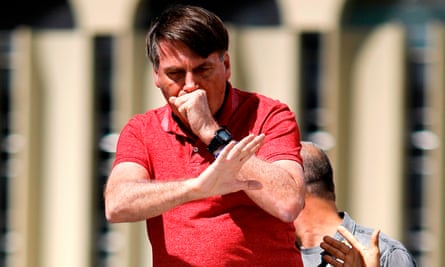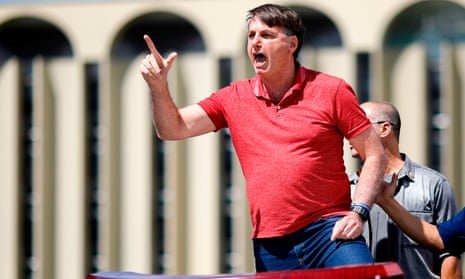Former presidents, politicians and newspaper editorial boards have lined up to denounce the “moronic” and “anti-democratic” behaviour of Brazil’s far-right leader after he hit the streets to egg on protesters demanding a return to military dictatorship.
As the number of deaths caused by Covid-19 rose to nearly 2,500 on Sunday, Jair Bolsonaro left his presidential palace in Brazil’s capital, Brasília, to fraternize with flag-waving radicals.
Among the demands their banners listed were an end to the social distancing measures opposed by Bolsonaro, the closure of Brazil’s congress and supreme court, and a re-run of a dictatorship-era decree used by military rulers in the late 1960s to suffocate their political opponents.
Quick GuideBrazil's dictatorship 1964-1985
Show
How did it begin?
Brazil’s leftist president, João Goulart, was toppled in a coup in April 1964. General Humberto Castelo Branco became leader, political parties were banned, and the country was plunged into 21 years of military rule.
The repression intensified under Castelo Branco’s hardline successor, Artur da Costa e Silva, who took power in 1967. He was responsible for a notorious decree called AI-5 that gave him wide ranging dictatorial powers and kicked off the so-called “anos de chumbo” (years of lead), a bleak period of tyranny and violence which would last until 1974.
What happened during the dictatorship?
Supporters of Brazil’s 1964-1985 military regime - including Jair Bolsonaro - credit it with bringing security and stability to the South American country and masterminding a decade-long economic “miracle”.
It also pushed ahead with several pharaonic infrastructure projects including the still unfinished Trans-Amazonian highway and the eight-mile bridge across Rio’s Guanabara bay.
But the regime, while less notoriously violent than those in Argentina and Chile, was also responsible for murdering or killing hundreds of its opponents and imprisoning thousands more. Among those jailed and tortured were Brazil’s first female president, Dilma Rousseff, then a leftwing rebel.
It was also a period of severe censorship. Some of Brazil’s best-loved musicians - including Gilberto Gil, Chico Buarque and Caetano Veloso - went into exile in Europe, writing songs about their enforced departures.
How did it end?
Political exiles began returning to Brazil in 1979 after an amnesty law was passed that began to pave the way for the return of democracy.
But the pro-democracy “Diretas Já” (Direct elections now!) movement only hit its stride in 1984 with a series of vast and historic street rallies in cities such as Rio de Janeiro, São Paulo and Belo Horizonte.
Civilian rule returned the following year and a new constitution was introduced in 1988. The following year Brazil held its first direct presidential election in nearly three decades.
At one point – snubbing social distancing rules for the umpteenth time since the coronavirus crisis began – Brazil’s paratrooper-turned-president clambered onto a truck to address the hundreds-strong assembly.
“The era of roguery is over. Now it’s the people who are in power,” Bolsonaro proclaimed outside the Brazilian army headquarters, coughing repeatedly as he spoke.

“Everyone in Brazil must understand that they must yield to the will of the Brazilian people.”
Bolsonaro’s outing – which some suspect was a deliberate provocation designed to distract from the rising Covid-19 death toll – sparked immediate censure.
Former president Fernando Henrique Cardoso, who governed from 1995 until 2003, tweeted: “Deplorable for the president to join anti-democratic protests. It’s time to unite around the constitution against all threats to democracy.”
Luiz Inácio Lula da Silva, president from 2003 to 2010, tweeted: “The same constitution that allows a president to be democratically elected also contains devices to stop them leading the country to the destruction of democracy and a genocide of the population.”
Rodrigo Maia, the head of Brazil’s lower house, said Brazil was in a dual fight against coronavirus “and the virus of authoritarianism”.
“In total, 2,462 deaths have been recorded in Brazil. Preaching a democratic rupture in the face of these deaths represents an unforgivable cruelty to the families of victims,” Maia tweeted. “We don’t have time to waste with coup-mongering bombast.”
Eduardo Paes, Rio de Janeiro’s former mayor, tweeted: “There have always been morons going around ranting against democracy … Generally they’re minorities whose tickles you don’t even feel.”
“[But it’s] something quite different when it’s the president – a democratically elected one – joining this kind of movement. There’s no way to remain quiet and not repudiate this,” Paes added.
The O Globo broadsheet called Bolsonaro’s speech a “dangerous” assault on the democratic rule of law.
Even members of the military top brass were reportedly upset, with one senior official urging citizens to ignore Bolsonaro’s actions. “Let the president talk to the nutters on his lonesome,” they told the news magazine Veja.
On Monday morning Bolsonaro denied he had been attacking Brazilian democracy but told reporters: “I am actually the constitution”.
Bolsonaro is a longstanding fan of the military men who ruled Brazil from 1964 until 1985, and autocrats including Chile’s Augusto Pinochet.
Bolsonaro’s reaction to Covid-19 – which he has downplayed as media “hysteria” – has proved similarly controversial. Last week Bolsonaro sacked his popular health minister, Luiz Henrique Mandetta, who had clashed with him for undermining health ministry recommendations designed to protect Brazilian lives.
Mandetta’s replacement Nelson Teich made no immediate comment on Bolsonaro’s decision to flout the same guidelines on Sunday.
